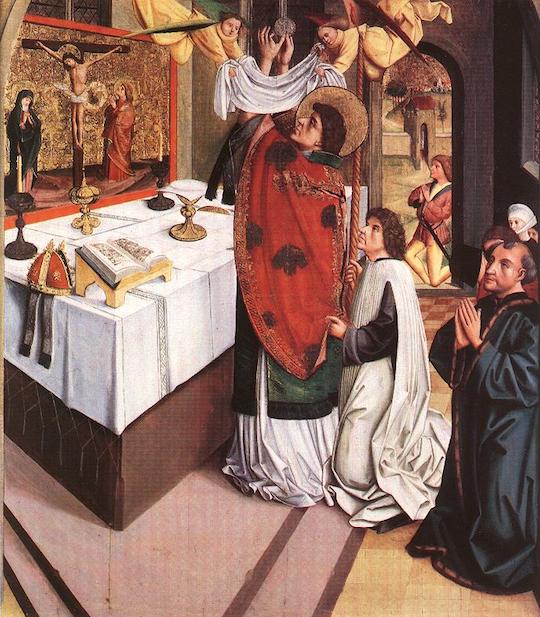Do you pray for your pastor each morning? After all, he is not like the manager of the supermarket, whom you only see when there is a problem. The pastor is the spiritual leader of the community and we are joined together as the family of God by the power of the Holy Spirit.
According to St. John Paul II, “the priest is called to express in his life the authority and service of Jesus Christ the head and priest of the Church by encouraging and leading the ecclesial community, that is, by gathering together ‘the family of God as a fellowship endowed with the spirit of unity’ and by leading it ‘in Christ through the Spirit to God the Father.’” All of the collective terms are there for a reason. We are a communion in the Spirit of God. This is not a concept that is supported by our culture, but then, the culture is not the yardstick by which we should be measuring ourselves.
Spiritual realities are difficult to describe because we are aware of so few of them and how they are woven into events in us and around us. Scripturally, the Church is called the Body of Christ, and that word “body,” with all its concreteness and integrity, “calls for a multiplicity of members, which are linked together in such a way as to help one another. And as in the body when one member suffers, all the other members share its pain, and the healthy members come to the assistance of the ailing, so in the Church the individual members do not live for themselves alone, but also help their fellows, and all work in mutual collaboration for the common comfort and for the more perfect building up of the whole Body.” (Pius XII)
That is on the level of the everyday activities of Church members. Then, spiritually, the power to do these activities – worshipping together, building a family, helping one’s neighbors and so on – sincerely and completely, comes from participating in the celebration of the Eucharist because, Pius XII continued, “in the Holy Eucharist the faithful are nourished and strengthened at the same banquet and by a divine, ineffable bond are united with each other and with the Divine Head of the whole Body.” Spiritual communion, again.
Pius XII also spoke about the priest himself: “Through Holy Orders men are set aside and consecrated to God, to offer the Sacrifice of the Eucharistic Victim, to nourish the flock of the faithful with the Bread of Angels and the food of doctrine, to guide them in the way of God’s commandments and counsels and to strengthen them with all other supernatural helps.” This is just one part, however, of the communion of the priest and his people.

There’s more. There exists a wide-ranging personal encounter between parishioners and the priest: “The truth is that the Christian experience of persons who are simple and humble, the spiritual enthusiasm of people who truly love God, the courageous application of the faith to practical life by Christians involved in all kinds of social and civil tasks – all these things are embraced by the priest who, while illuminating them with his priestly service, at the same time draws from them a precious spiritual nourishment.” (St. JP II)
The pastor and the people are in a symbiotic relationship. This is wholly different, to say the least, from the Enlightenment take on the Church and the Faith. In Enlightenment culture, the people are supposed to be nourished by the secular elite. The substantial and multilayered breadth of the relationship between the priest and the people, however, is becoming more apparent as clergy and laity get out of the lord-of-the-manor view of the priesthood.
There are all kinds of spiritual nuggets being passed back and forth .“Nice homily today, Father,” may encourage your pastor, but the relationship is – and ought to be acknowledged – to be nothing less than cosmic. Each day, the celebration of Mass means that we have shared in the eternal Liturgy of Heaven. How about putting some of that into words next time you meet your pastor? Then, of course, there are the saints, the martyrs, the doctors, and the sainted pastors whose feasts we celebrate. Did anything in their lives catch fire with you?
Hurrying back to the secular world as soon as possible after Mass is not a virtue, and most times it’s far from necessary. There really is time to say a few words to God after Mass in thanksgiving and a few words to the pastor as well.
Summing up, the spiritual communion should be of more importance to us than the Sunday afternoon football games or binge-watching “Breaking Bad.” It is the entryway to eternal life. We should be reminded of that each time the pastor prays about the communion with the saints and the way that they are constantly interceding for us (Eucharistic Prayer) to get us through the day.
Your pastor is included in that communion – and needs your prayers.














